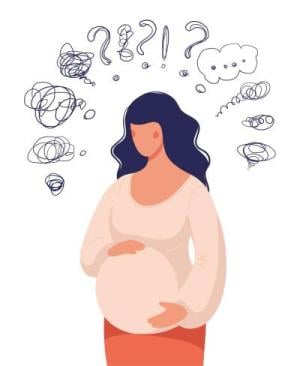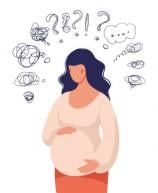Unseen Trauma: Recognizing and Understanding Childbirth-Related PTSD
Unseen Trauma: Recognizing and Understanding Childbirth-Related PTSD

What comes to mind when you think of events that may be the cause of post-traumatic stress disorder (PTSD)? Perhaps you think about soldiers in combat, a terror attack, a terrible car accident or sexual assault. But were you also thinking about birth as an event that can trigger PTSD?
Childbirth PTSD is different than other forms of PTSD as, unlike other trauma-related events, childbirth is an index event that is socially generally considered to be positive. Childbirth is often celebrated as a joyous event, the start of a new chapter in life. But for many women, this event can also be a source of deep psychological trauma. Prepartum vulnerability factors for childbirth PTSD include belonging to a population at risk (this variable is defined differently across studies), depression during pregnancy, fear of childbirth, poor health or complications during pregnancy, previous PTSD, and counseling during pregnancy. Risk factors at birth include negative subjective birth experience, operative birth, lack of support, and dissociation (e.g. Ayers et al., 2016; Heyne et al., 2022). Childbirth-related PTSD can be a severe condition that affects both mothers and their families (e.g. Garthus-Niegel et al., 2018).
Research shows that approximately 30% of women who give birth describe the experience as traumatic (Ayers et al., 2009) and that up to 12% of mothers and 1% of fathers have significant posttraumatic stress symptoms (PTSS) following childbirth. Of those 5% of mothers and 1% of fathers subsequently developed PTSD (Heyne et al., 2022)
Childbirth Perception and Under Recognition
Despite the growing literature on the prevalence of childbirth PTSD and its effects on mothers and families, research on the perceptions of childbirth PTSD, and whether people acknowledge those who suffer from it as victims of this event, is missing.
In a study that was recently published in the Journal of Anxiety Disorders we took a first step in filling this gap by testing how people perceive childbirth PTSD in comparison to trauma caused by other index events (Kahalon & Handelzalts, 2024). We found that when we presented people with brief descriptions of a woman experiencing PTSD symptoms, the woman in the story was less likely to be recognized as suffering from PTSD when the trauma index event was birth compared to descriptions of a woman suffering from the same symptoms but resulting from other index events, such as sexual assault or car accidents. This under-recognition was found in the general public as well as with mental health professionals, who are less likely to diagnose PTSD when childbirth is the trigger.
Why Does it Matter?
The under-recognition of childbirth PTSD can have significant consequences. Without proper recognition, mothers may not receive the emotional or medical support they need. This lack of support can delay recovery, as social acknowledgment and support are crucial for healing from PTSD. Even mental health professionals can overlook childbirth PTSD, leading to misdiagnosis and inadequate treatment.
Why is Childbirth PTSD Under-Recognized?
We are currently working to understand the mechanisms underlying this under recognition. We believe that one of the main reasons childbirth PTSD is under-recognized is due to the generally positive perception of childbirth. Society often views childbirth as a happy event, making it difficult to accept that it can also be traumatic. Further, media representations of PTSD typically focus on military or combat experiences, which limits awareness of other PTSD triggers, including childbirth. Another challenge is the overlap of symptoms between childbirth PTSD and other common postpartum experiences. For example, sleep disturbances and anxiety are common after childbirth, leading to potential misdiagnosis or dismissal of the symptoms as normal postpartum issues.
What Can We Do?
Knowing that birth PTSD is underrecognized suggests that raising awareness about childbirth PTSD is essential. High levels of social support can significantly impact PTSD symptoms and recovery. Changing how society views childbirth trauma can lead to better support systems and more effective treatment options. Educating both the public and healthcare providers about childbirth PTSD is crucial for improving recognition and support.
Join the Conversation
- Have you or someone you know experienced childbirth trauma? What was your experience with recognition and support?
- Do you think societal views on childbirth impact the recognition of trauma? How can we change this?
- What steps can be taken to improve awareness and support for childbirth PTSD among healthcare providers and the public
References:
- Ayers, S., Bond, R., Bertullies, S., & Wijma, K. (2016). The aetiology of post-traumatic stress following childbirth: a meta-analysis and theoretical framework. Psychological Medicine, 46, 1121-1134. doi:10.1017/S0033291715002706
- Ayers, S., Harris, R., Sawyer, A., Parfitt, Y., & Ford, E. (2009). Posttraumatic stress disorder after childbirth: analysis of symptom presentation and sampling. Journal of affective disorders, 119(1-3), 200-204.
- Garthus-Niegel, S., Horsch, A., Handtke, E., Von Soest, T., Ayers, S., Weidner, K., & Eberhard-Gran, M. (2018). The impact of postpartum posttraumatic stress and depression symptoms on couples’ relationship satisfaction: a population-based prospective study. Frontiers in Psychology, 9, 1728. https://doi.org/10.3389/fpsyg.2018.01728
- Heyne, C. S., Kazmierczak, M., Souday, R., Horesh, D., Lambregtse-van den Berg, M., Weigl, T., ... & Garthus-Niegel, S. (2022). Prevalence and risk factors of birth-related posttraumatic stress among parents: A comparative systematic review and meta-analysis. Clinical Psychology Review, 94, 102157.
- Kahalon, R., & Handelzalts, J. (2024). Investigating the under-recognition of childbirth-related post-traumatic stress disorder among the public and mental health professionals. Journal of anxiety disorders, 102897.




















